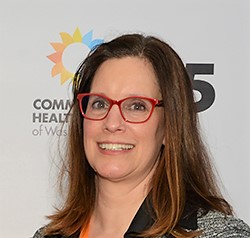What if you could predict the future and then adjust it? Preventive care is kind of like that.
Healthy habits and regular visits to your doctor can cut down on your health care costs and add years to your life.
What is preventive health care?
Preventive health care is when you work with your doctor to be the healthiest version of yourself. Staying connected with your health care team helps you avoid serious illness and spot health problems early.
What this looks like is different for different people. But one thing is the same for everyone. Your annual checkup with your primary care provider is key to staying healthy and living a long life.
Why is preventive health care important?
Preventive care is how doctors help save the most lives! Did you know:
- Many preventive care services are available at no cost to you with most health insurance plans.
- When you catch a health problem early, you are more likely to recover from it.
- Doctors can also help with general health goals, like eating healthy or quitting smoking.
What to expect at your annual checkup or physical
At your annual checkup, your doctor’s goal is to make sure you are healthy, check for any early signs of a health problem, and answer your health questions.
The more information your doctor has about you, the better they can care for you. At your appointment, your doctor will check your:
- Medical history. They will ask you about your lifestyle, known medical conditions, and information about your family medical history. If you have any concerns about your health or want to talk about family planning, you can mention this, too.
- Weight, lungs, and heart. Your weight and height are usually measured first; next, breathing, temperature, blood pressure, and heart rate. This helps your doctor see how the body’s basic functions are operating.
- Throat, nose, and ears, as well as your teeth and gums. During this part, they often shine a small light at you so they can see into your mouth, each ear, and briefly up your nose. Don’t worry; it doesn’t hurt, and doctors have surely seen it all!
Sometimes, there are other exams based on your unique needs. They may also check your stomach, reflexes, eyes, or skin.

“It is so important to go to the doctor each year for a checkup, even when you feel great. Getting your annual physical is the best way to stay in control of your health so you can do the things you love and be there for those that need you!”
– Dr. LuAnn Chen, CHPW Senior Medical Director
What is a screening?
A screening is a test that helps a doctor find signs of a disease. Your doctor will recommend different screenings based on your medical history, lifestyle, age, assigned sex at birth, and other things. Most health insurance plans cover recommended preventive screenings, so there is no cost to you.
The most common tests screen for:
- Different types of cancer, including breast (mammogram), lung, colon (colorectal), and cervical (Pap).
- Sexually transmitted infections (STIs) through a urine sample, swab, or blood test.
- Risk for Heart Disease with a cholesterol blood test.
Cancer and heart disease are leading causes of death and are more easily treated when caught early. Early detection could add years (or decades) to your life!
How do you know which vaccines to get?
Vaccines help your body fight specific diseases and can help prevent viruses that cause cancer. They also help your community stay healthy by preventing diseases from spreading.
Some vaccines you get every year, like the flu or COVID-19 vaccine. Others, you may get every few years or once in a lifetime.
After you have scheduled your annual checkup, take these steps to learn more about which vaccines are right for you.
- Locate your vaccination or immunization records. Ask your doctor’s office, health plan provider, or check online.
- Review recommended vaccine schedules for adults and kids.
- Check the vaccine guidelines. If you have an autoimmune disorder or another condition, some vaccines may not be safe for you.
Vaccines are one of the safest ways to protect your health. But, if you have any concerns, let your provider know.
How do you know what preventive care you need and when?
Start by scheduling your yearly physical or checkup. Your doctor can help you figure out which vaccines or screenings you may need during your appointment and help you decide what to do next based on your individual health needs.
Not sure who your PCP is? If you are a Community Health Plan of Washington member, you can find out who your doctor is by calling 1-800-440-1561 (TTY, dial 711). We’re here to help 8 a.m. – 5 p.m., Monday through Friday.
Learn more
- What is a primary care provider and how to choose one
- Find a doctor in the CHPW network: Apple Health (Medicaid) | Medicare Advantage | Individual & Family Cascade Select
- Why is it so important for seniors to get a flu shot
- Immunization Schedule by Age: (Birth-18) | (19-65+)
- Find vaccines near you


